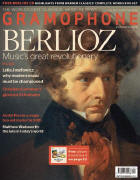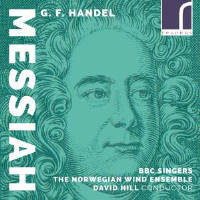Texte paru dans: / Appeared in: |
|
|
Outil de traduction (Très approximatif) |
|
|
Reviewer: Jonathan Freeman-Attwood
The size and nature of forces employed in the history of Messiah, and their impact on performance practices over the ages, takes us into a labyrinthine world. Additional wind instruments as a means of ‘judicious improvement’ started as early as Adam Hiller’s famous performance in Berlin Cathedral in 1786 – and there has followed a run of expansive interpretations into the ‘modern’ era of Wood and then Goossens’s version under Beecham. Here, though, we have winds as a genuine alternative to the strings-plus-winds-plus-brass gargantuan model. Stian Aareskjold of The Norwegian Wind Ensemble has, if anything, transcribed Messiah for winds and chamber choir as a means of resonating with certain historical sensibilities and, with the use of a harpsichord continuo, even practices. At best, it presents some gloriously tactile and supple solutions to this almost bomb-proof maststerpiece. ‘Comfort ye’ is one of many atmospheric movements, in this case beguiling in a spare translucence underpinning Samuel Boden’s beautiful annunciation and shaping. The choruses in Part 1, especially, unveil an easy balance between the ‘Harmoniemusik’ accompaniment and the resilient bravura and highly experienced execution of the BBC Singers. Taken as a whole, the results are something of a curate’s egg. There are times where the medium offers attractive new perspectives (the Pifa is wonderfully bucolic in its new feathers, and how winsome the flutes seem in ‘How beautiful are thy feet’) and other occasions where harmonic clarity becomes the trade-off for the kind of textural warmth you get with strings. The ‘Hallelujah’ sounds as if it’s on helium, such is the predominance of upper partials; one recalls the kind of military band accompaniments from acoustic recordings of the early 20th century. The upper winds can sound a touch wearing over a couple of hours, though credit must be given to Aareskjold’s clever allocation of roles in the interest of both variety and stamina, and Hill’s well-fashioned approach to speed and dynamics rides over some potential pitfalls. Of the singers, each seems more comfortable in some arias than others. It’s also asking a lot to rein back the opulently operatic instincts of Susanna Hurrell in what is quite an intimate environment. James Platt delivers ‘The people that walked in darkness’ with great authority though he’s rather less settled in Handel’s bass version of ‘But who may abide’. Likewise, Rebecca Afonwy-Jones gradually warms to her task with a touchingly openhearted simplicity in ‘He shall feed his flock’ and a finely honed reading of ‘He was despised’. If not revelatory, this performance in Aareskjold’s transcription is rather more than a curiosity: it’s the underlying tenderness of the new orchestration which will ensure return visits, and the unfussy high-quality wind playing of NEW in tandem with the evergreen BBC Singers. |
|




